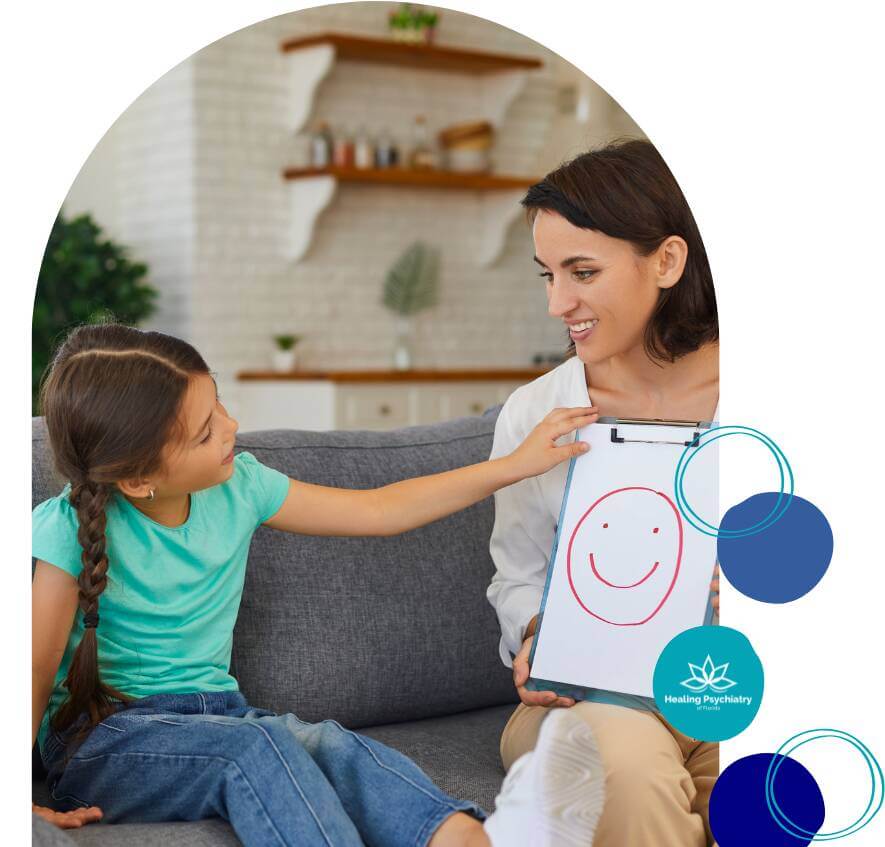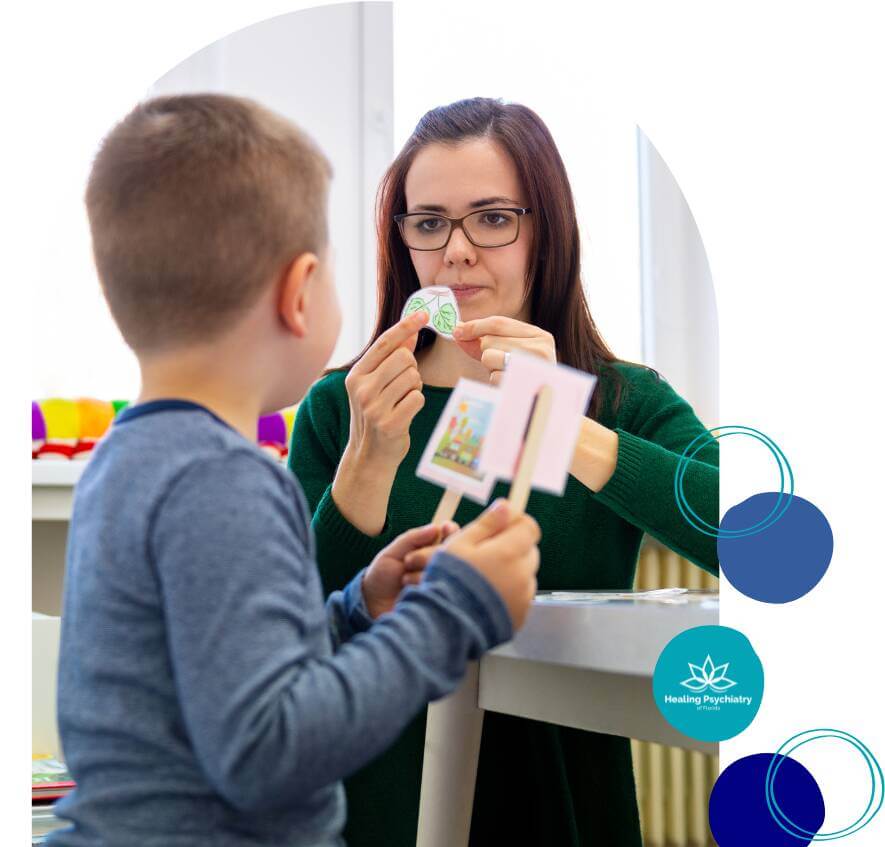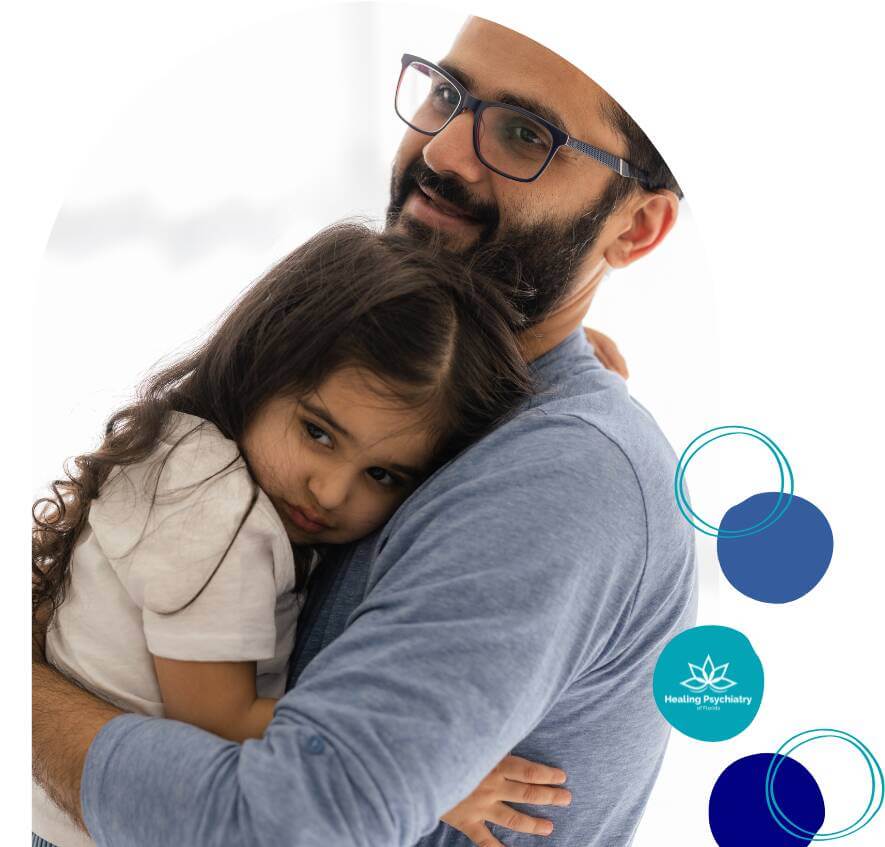Children’s Therapy for Anxiety
At Healing Psychiatry of Florida, we offer children’s therapy for anxiety that addresses both behavior and emotion. Whether your child is facing generalized anxiety disorder, separation anxiety disorder, panic disorder, or persistent worries that don’t seem to let up, we help parents make sense of what’s happening and build a clear path forward. Our therapists are trained to recognize the difference between developmentally normal fears and severe anxiety that limits a child’s daily functioning.
Treatment may include cognitive behavioral therapy, family therapy, or other strategies that help children and families reduce stress and regain a sense of calm. In more complex cases, our team may involve licensed health care professionals or a healthcare provider to explore additional support.
When anxiety starts to get in the way of your child’s sleep, school, or confidence, it’s time to get support that actually helps.

Start Your Session Today
What Anxiety Looks Like in a Child’s World
Children rarely describe anxiety the way adults do. They don’t say “I’m overwhelmed” or “I have a racing mind.” Instead, they avoid things, act out, freeze up, or become emotionally reactive over situations that seem small. These behaviors are often misunderstood as defiance or oversensitivity, but they’re usually signs of deeper discomfort. Understanding how anxiety presents in children helps us respond to the real issue, not just the behavior.
When Behavior Becomes a Response to Fear
Some children refuse to go to school, won’t sleep alone, or melt down over unexpected changes. These may seem like defiance or stubbornness—but often, they’re a child’s way of protecting themselves from something that feels overwhelming. Anxious children might cry, hide, get angry, or cling in situations that feel completely manageable to other kids. What looks like misbehavior is often emotional distress tied to fear.
We see this often with separation anxiety disorder, where being away from a parent creates panic-like responses. In other cases, it may be social phobia or social anxiety disorder, where even normal peer interaction triggers intense fear. In young children, this looks like regression or clinginess. In older children, it may show up as avoidance, stomach aches, or shutting down completely.
When the Body Starts Signaling What the Child Can’t Say
Many kids with anxiety don’t talk about feeling scared—they feel it in their bodies. Physical symptoms like headaches, stomach aches, tightness in the chest, or lightheadedness becomes regular complaints, especially during transitions or pressure moments. Parents often hear, “I don’t feel good,” before school, playdates, or new activities.
Some children also experience panic attacks, sudden moments of overwhelming fear that cause shortness of breath, racing heart, and emotional shutdown. These can feel terrifying—not just to the child, but to parents who don’t know what’s happening. These physical signals often show up before a child even understands what anxiety is.
When Sleep Disrupts, Worry Grows, and Life Feels Smaller
Anxiety can affect every part of a child’s routine, but sleep is often the first to go. Difficulty sleeping, resistance at bedtime, or repeated night waking are common in children with anxiety. Over time, this impacts mood, energy, and confidence. Children may begin to avoid school, social situations, or even familiar environments—not because of laziness or resistance, but because their internal sense of safety has changed.
Insurances Accepted










See what others are saying about Healing Psychiatry of Florida
Meet Our Anxiety Treatment Specialists
At Healing Psychiatry of Florida, our therapists specialize in working with children (and adolescents) who struggle with worry, fear, and emotional overload. We don’t expect anxious children to open up right away. Whether your child is avoidant, emotionally reactive, or quiet and withdrawn, we adjust to their pace and personality. We support children diagnosed with a range of anxiety disorders, including childhood anxiety, social anxiety disorder, and separation anxiety disorder. Therapy sessions are adapted based on your child’s age, personality, and symptoms—so whether they’re managing extreme fear in unfamiliar situations or struggling with daily routines at school or home, they’re met with care that fits.
Every plan is designed to help your child reduce anxiety over time, improve daily functioning, and reconnect with confidence. Many children learn to manage their fears, shift negative thoughts, and enjoy more freedom in their day-to-day life.




For Children Affected by Change, Grief, or Trauma
A move, a divorce, a traumatic experience—even something that seems small to an adult creates a lasting sense of threat in a child. These children may develop anxiety tied to perceived or actual danger, and often carry it silently. Our therapists help them feel safe again, teaching coping skills, building emotional language, and supporting them in processing their experiences at a pace that works for them.
For Children With Sensitivity, Family History, or Overloaded Environments
Some children react more strongly to everyday situations. Maybe it runs in the family, maybe it’s the environment, or both. We work with naturally reactive kids, those with a family history of anxiety disorders, or those growing up in high-pressure homes where environmental factors keep their nervous systems in overdrive. We use cognitive behavior therapy, relaxation techniques, and practical structure to help them reset.


For Children Stuck in Avoidance or “Worry Loops”
Once anxiety takes hold, it often reinforces itself: avoid the hard thing, and the worry shrinks—until it comes back stronger. Our approach interrupts this loop. Through cognitive behavioral therapy, gradual exposure, and structured support, children learn to challenge negative thoughts, face fears in manageable steps, and feel more in control. We adjust the treatment plan based on the child’s age, temperament, and what’s realistic for home and school.
FAQs for Our Anxiety Treatment Services
How do I know if my child’s anxiety symptoms are actually serious?
Mild worry is common, but when anxiety symptoms begin to affect your child’s sleep, school, or ability to enjoy day-to-day activities, it may signal a deeper issue. If you’ve noticed physical complaints, avoidance, or intense reactions, those may be signs of significant distress that go beyond typical development.
Can anxiety in my child look different than it does in other children?
Yes. Some children cry, others shut down, and some avoid situations entirely. Your child’s symptoms might not match what you’ve seen in other children, but that doesn’t mean they’re any less real. Therapy helps identify what’s underneath the behavior and how your child experiences anxiety.
Why is my child so sensitive to things like loud noises or transitions?
Sensitivity to loud noises, unfamiliar situations, or even minor changes in routine is a sign of how your child processes stress. These reactions are common in kids who experience anxiety, especially in overstimulating environments or outside their familiar settings.
Will therapy really help my child manage their anxiety in everyday life?
Yes—when it’s the right treatment. Individual therapy helps your child manage worry in the moments that matter: classroom transitions, social situations, bedtime, and more. The goal is always to reduce anxiety in ways that impact their daily life, not just what happens in the session.
What if my child doesn’t understand why they feel this way?
Many children can’t explain what’s wrong—they just know something feels off. Therapy helps your child understand what anxiety feels like in their body and mind. Once they do name it, they learn how to work with it instead of against it.
Will my child need medication to make progress?
Not necessarily. Most children benefit first from therapy alone. If symptoms persist or intensify, medication may be part of the plan. Our clinicians discuss options carefully and work closely with you to decide what’s most appropriate based on your child’s age, needs, and progress.
Contact us
For more information about our systems and services, contact Healing Psychiatry of Florida.
Healing Psychiatry of Florida
Altamonte Springs
Lake Baldwin
Altamonte Springs
108 W Citrus St.
Altamonte Springs, FL 32714
Monday – Thursday: 8:00 AM – 6:00 PM
Friday: 8:00 AM – 5:00 PM
Saturday & Sunday: Closed
Lake Baldwin
3203 Lawton Rd. Suite 140
Orlando, FL 32803
Monday – Thursday: 8:00 AM – 6:00 PM
Friday: 8:00 AM – 5:00 PM
Saturday & Sunday: Closed
